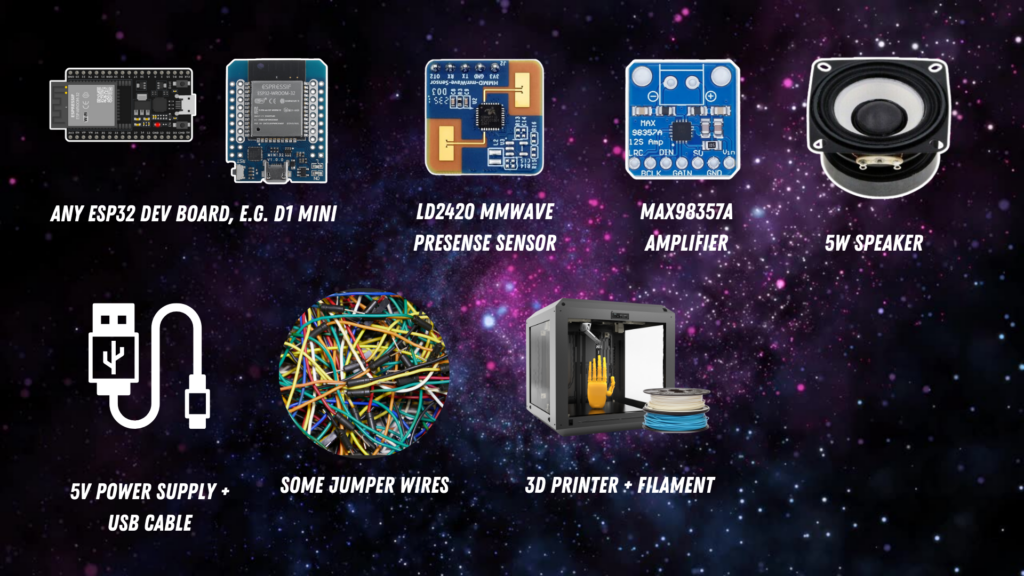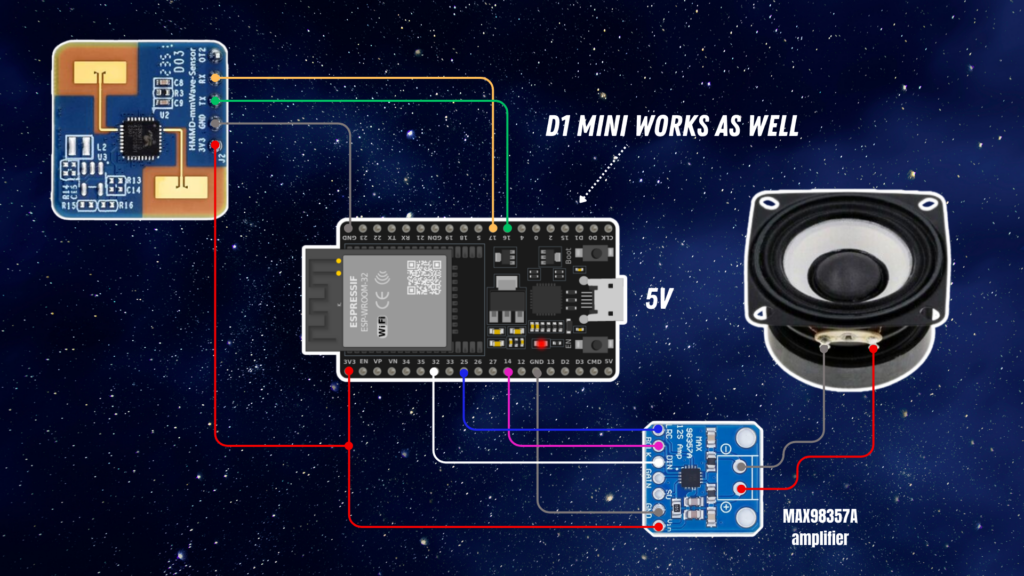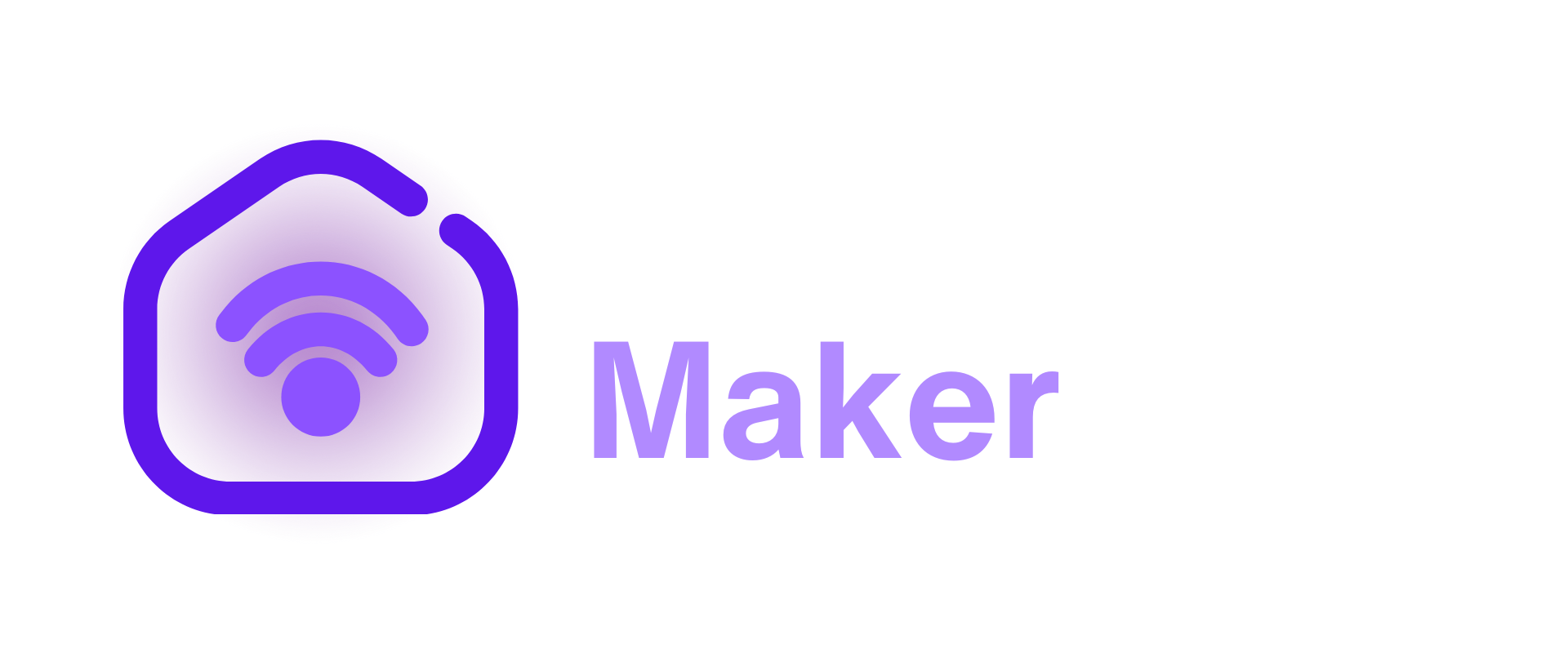Looking to enhance your smart home with a touch of relaxation and cutting-edge technology? In this tutorial, we’ll show you how to build a Smart Twitterbox—a DIY device that automatically plays calming sounds like birdsong and jungle ambiance when it detects your presence. Using an advanced mmWave presence sensor and seamless integration with Home Assistant, this project offers precise motion and even presence detection and versatile automation for any room in your home. Whether you’re new to DIY electronics or an experienced maker, this step-by-step guide will walk you through creating your own Smart Twitterbox and setting up the perfect ambiance effortlessly.
You can watch the following YouTube video which explains everything:
Required components

To get this project started, we need the following components:
- An ESP32 dev board, for example a D1 mini ESP32
- An LD2420 mmWave presence sensor
- A MAX9857A amplifier
- A 5W speaker
- a 5V power supply & USB cable
- Somit jumper wires
- A 3D priner + filament OR a 3D printing service
Wiring scheme

The ESP32 dev board is the heart of the architecture. It connects to the LD2420 presence sensor and to the MAX98573A. The LD2420 detects presence an when presence is detected, then sound is played via the MAX98573A amplifier on the speaker.
ESPHome YAML code
After we have wired everything up, we need to prepare, compile and flash the software to the ESP32 dev board. We use ESPHome for that which allows for a super simple configuration just using YAML files. To understand how you can compile and flash ESPHome code to the ESP32 dev board please follow the official docs. In the following listing, you can find the ESPHome YAML code.
The assumption is that you have wired everything exactly as shown above, so all the GPIOs match. Please be aware that YOUR_ENCRYPTION_KEY, YOUR_OTA_PASSWORD and YOUR_AP_PASSWORD are just placeholders as those are keys/passwords that are usually auto generated by ESPHome. Please note that you need to replace YOUR_FILE_URL with the URL to your sound file.
esphome:
name: smart-twitterbox
friendly_name: smart-twitterbox
esp32:
board: esp32dev
framework:
type: arduino
# Enable logging
logger:
# Enable Home Assistant API
api:
encryption:
key: YOUR_ENCRYPTION_KEY
ota:
- platform: esphome
password: YOUR_OTA_PASSWORD
wifi:
ssid: !secret wifi_ssid
password: !secret wifi_password
# Enable fallback hotspot (captive portal) in case wifi connection fails
ap:
ssid: "Smart-Twitterbox"
password: YOUR_AP_PASSWORD
captive_portal:
uart:
tx_pin: GPIO17
rx_pin: GPIO16
baud_rate: 115200
ld2420:
text_sensor:
- platform: ld2420
fw_version:
name: LD2420 Firmware
sensor:
- platform: ld2420
moving_distance:
name : Moving Distance
binary_sensor:
- platform: ld2420
has_target:
name: Presence
on_press:
- media_player.play_media: 'https://YOUR_NABU_CASA_ID.ui.nabu.casa/local/bird_twitter.mp3'
select:
- platform: ld2420
operating_mode:
name: Operating Mode
number:
- platform: ld2420
presence_timeout:
name: Detection Presence Timeout
min_gate_distance:
name: Detection Gate Minimum
max_gate_distance:
name: Detection Gate Maximum
gate_select:
name: Select Gate to Set
still_threshold:
name: Set Still Threshold Value
move_threshold:
name: Set Move Threshold Value
button:
- platform: ld2420
apply_config:
name: Apply Config
factory_reset:
name: Factory Reset
restart_module:
name: Restart Module
revert_config:
name: Undo Edits
i2s_audio:
- id: i2s_in
i2s_lrclk_pin: GPIO27
i2s_bclk_pin: GPIO26
- id: i2s_out
i2s_lrclk_pin: GPIO25
i2s_bclk_pin: GPIO14
media_player:
- platform: i2s_audio
name: "Twitterbox Mediaplayer"
i2s_audio_id: i2s_out
id: speaker_i2s
dac_type: external
i2s_dout_pin: GPIO32
mode: mono
switch:
- platform: template
name: "Play sound"
id: "play_sound"
turn_on_action:
- media_player.play_media: YOUR_FILE_URL
- switch.turn_off: play_soundPrint the housing
Next step is to print the housing. You can download the files from printables:
https://www.printables.com/de/model/1000815-diy-twitterbox-box-plays-sound-when-person-present
Try it out
After you have wired everything up, you can play around with the device. I should play the defined sound file (YOUR_FILE_URL) whenever a person is present.


Comments are closed